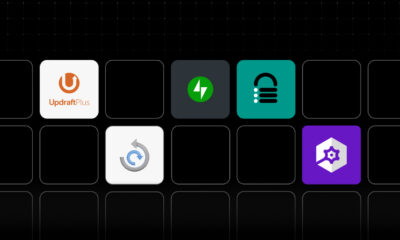WORDPRESS
30 Latest Shopify Statistics For 2023 (Revenue, Market Share, And More)
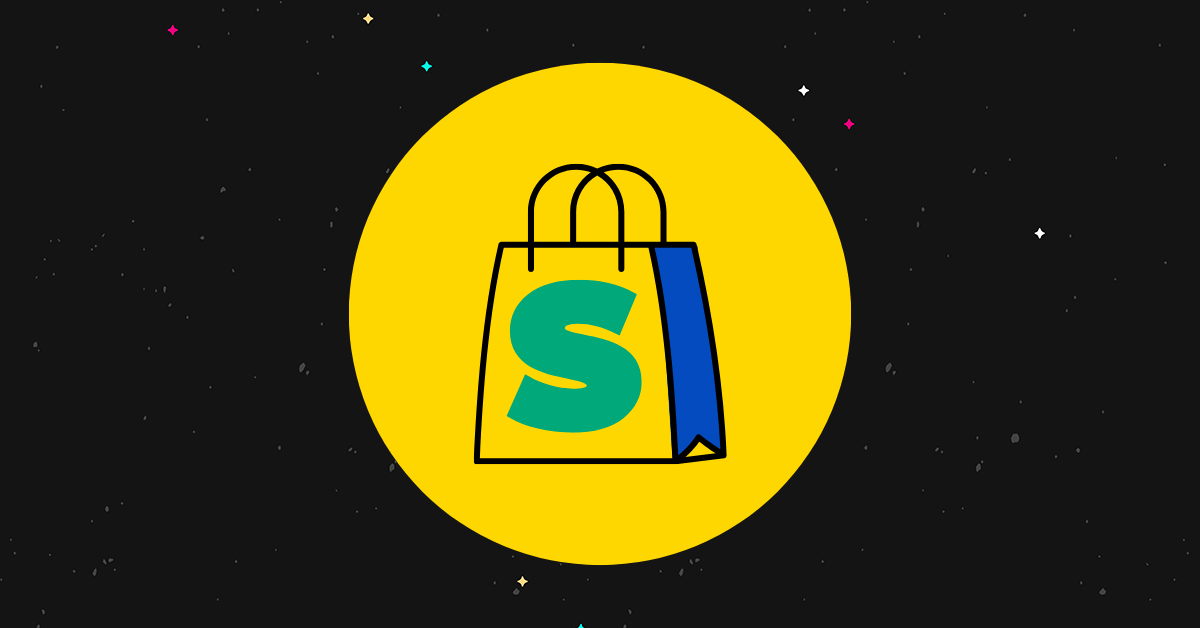
Want to know how much money Shopify merchants have generated in total? Curious how many Shopify stores use a custom theme?
While we don’t know the exact number of Shopify stores or Shopify users there are out in the wild outside of the “millions” Shopify claims there are, we do have a number of additional Shopify statistics in this post, including how Shopify impacts online businesses.
Our categories for Shopify stats include general stats, stats for merchants, and stats on themes and apps.
Let’s get into it.
Editor’s top picks – Shopify statistics
Here are the top five Shopify statistics you need to know:
- Shopify merchants have accrued more than $650 billion in ecommerce sales. (Shopify1)
- Shopify generated $5.6 billion in revenue in 2022. (Shopify2)
- Shopify powers 26% of all ecommerce stores on the web. (BuiltWith)
- The average revenue per customer for all Shopify stores is $92 per customer. (Littledata)
- 50% of Shopify Plus merchants saw lower conversions and site traffic in 2022. (Shopify’s Commerce Trends Report for 2023)
General Shopify statistics
1. Shopify sellers have generated more than $650 billion in revenue
According to Shopify’s own data on sales generated from the Shopify platform, Shopify stores have generated more than $650 billion in revenue collectively.
Source: Shopify1
2. Shopify revenue amounted to $5.6 billion in 2022
Shopify revenue increased by 21% in 2022 to a total revenue of $5.6 billion.
This data comes from Shopify’s fourth quarter and full 2022 financial results.
$1.5 billion of that revenue came from Subscription Solutions while $4.1 billion came from Merchant Solutions.
Shopify’s monthly recurring revenue is $109.5 million, according to the report.
The platform’s operating loss amounted to $822.3 million in 2022 while their profits were $2.8 billion.
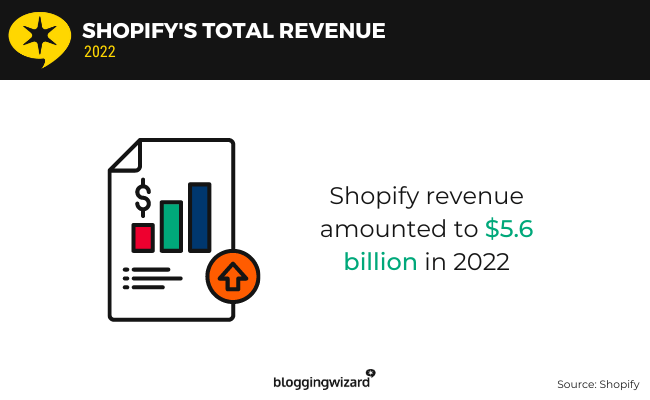
Source: Shopify2
3. Shopify saw a gross merchandise value of $197.2 billion in 2022
Shopify merchants brought in $197.2 billion in 2022, a 12% increase from 2021.
54%, or $106.1 billion, of Shopify’s gross merchandise volume for 2022 came from Quarter 4 alone.
This is on par with 2021, which saw 49%, or $85.8 billion, of the year’s GMV come from Quarter 4.
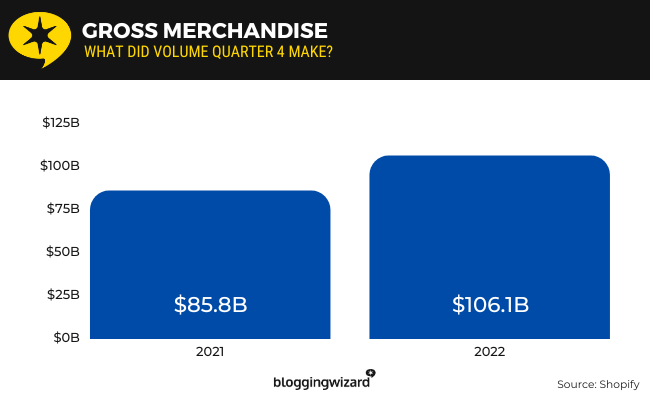
Source: Shopify2
4. 26% of ecommerce stores around the world use Shopify
According to data on more than 24 million ecommerce stores from across the web, 26% of all online stores, which is the majority of all ecommerce stores, use Shopify.
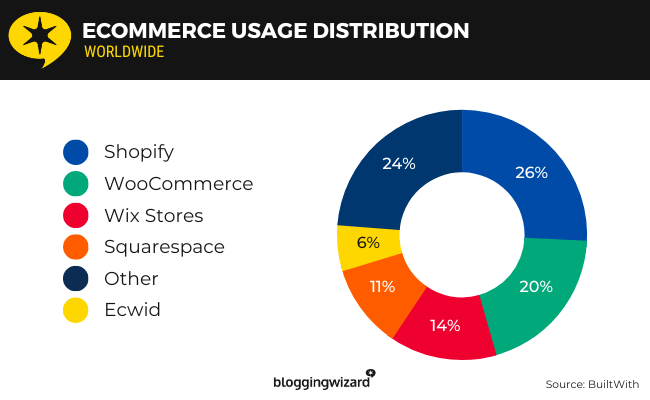
20% use WooCommerce, 14% use Wix, 11% use Squarespace and 6% use Ecwid.
24% of stores use a dozen or so other ecommerce platforms, but they have less than 2% of usage each.
Source: BuiltWith1
5. Shopify.com receives 76.7 million visits per month
According to traffic data collected by Similarweb over a three month period on the domain Shopify.com, Shopify traffic amounts to over 76.7 million visits per month on average.
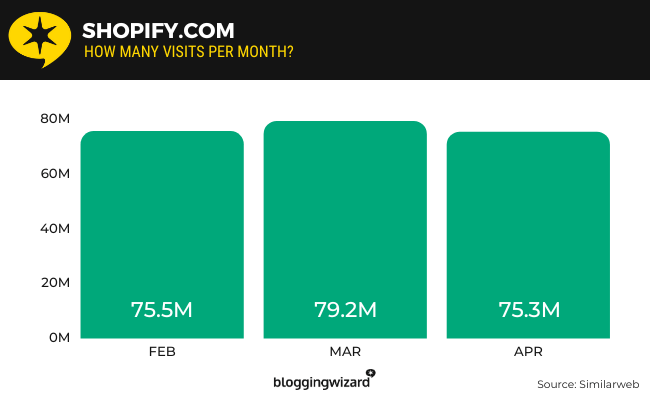
For comparison’s sake, WooCommerce.com receives 2.8 million visits per month on average, Squarespace.com receives 36.2 million and Ecwid.com receives 3.5 million visits.
WordPress.org, which hosts the free WooCommerce plugin, receives 17.7 million visits per month on average.
To be fair, most WooCommerce users have their hosts install WordPress for them. Then, they can install the WooCommerce plugin from the admin section of their stores without ever visiting WooCommerce.com or WordPress.org, so it makes sense for their numbers to be lower.
Even so, these metrics demonstrate the dominance Shopify has in the global ecommerce market.
The only thing standing in their way from overshadowing other platforms is their ability to acquire new customers and maintain relationships with current Shopify customers.
Source: Similarweb1, Similarweb2, Similarweb3, Similarweb4, Similarweb5
6. 29% of ecommerce stores in the United States use Shopify
BuiltWith also collects data on a country basis.
They found that the majority of ecommerce stores in the United States, or 29%, use Shopify.
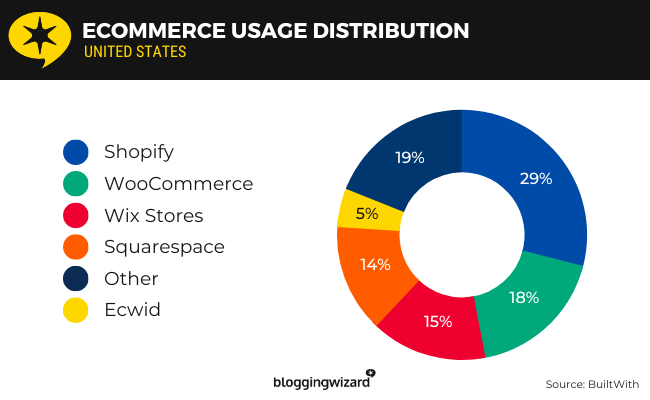
18% use WooCommerce, 15% use Wix, 14% use Squarespace and 5% use Ecwid.
19% of stores use other ecommerce platforms.
Source: BuiltWith2
7. 22% of ecommerce stores in the United Kingdom use Shopify
Shopify is nearly neck and neck with WooCommerce in terms of usage in the UK.
While a few thousand more ecommerce stores in the UK use WooCommerce, the number of Shopify stores is nearly the same number at 22%.
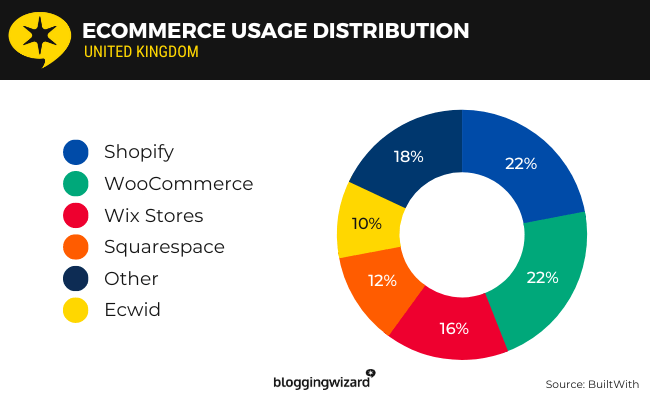
16% use Wix, 12% use Squarespace and 10% use Ecwid.
18% of stores use other ecommerce platforms.
Source: BuiltWith3
8. 19% of the web’s top 10,000 ecommerce stores use Shopify
BuiltWith also arranges its data based on the web’s top 1 million, top 100,000 and top 10,000 ecommerce stores.
This data reveals that the majority, or 19%, of the top 10,000 stores on the web use Shopify.
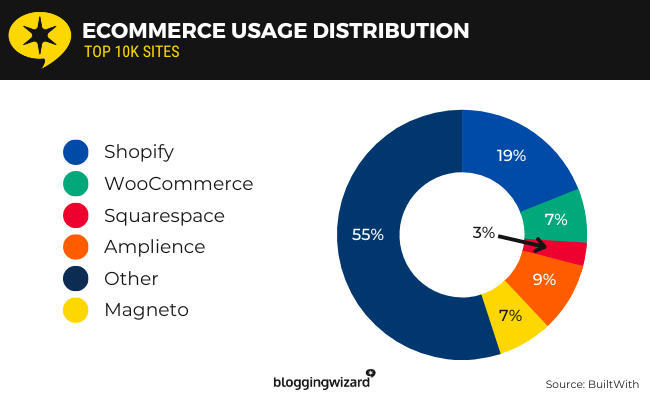
9% use Amplience, 7% use WooCommerce, 7% use Magento and 3% use Squarespace.
55% use a long list of other ecommerce platforms.
And in case you’re curious about the other lists, 21% of the top 1 million stores on the web use Shopify while 5% use Shopify Plus (23% use WooCommerce).
20% of the top 100,000 stores on the web use Shopify while 3% use Shopify Plus.
Source: BuiltWith4
Shopify statistics for merchants to know
9. The average Shopify store revenue is $92 per customer
Littledata, an analytics tool for ecommerce platforms, surveyed 2,261 Shopify stores in September of 2022.
They discovered that Shopify stores have an average revenue per customer of $92.
They also found that if your average revenue per customer is at least $209, you are in the top 20% of all Shopify stores.
A Shopify store owner who sees an average revenue per customer of at least $326 is in the top 10%.
Similarly, if your average revenue per customer is lower than $53, you’re in the bottom 20% of all Shopify stores.
You’re in the bottom of all Shopify stores if your average revenue per customer is $42 or lower.
Source: Littledata
10. Over 100 million shoppers around the world use Shop Pay
Shop Pay is Shopify’s answer to the ever popular online shopping payment gateways PayPal Checkout and Amazon Pay.
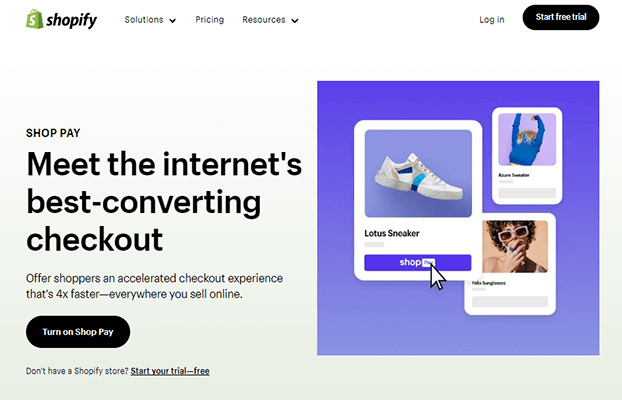
It’s a payment system buyers can add their credit or debit cards to so they can checkout on Shopify stores in a single click.
According to Shopify’s metrics, more than 100 million online shoppers use Shop Pay.
To be more specific, 43% of Shopify buyers use Shop Pay, and 1 in 5 buyers choose the option at checkout.
Shoppers can even use the payment system at non-Shopify stores that accept Shop Pay.
Source: Shopify3
11. Shopify merchants see a 6.6-times higher return on investment on ad spend when using Shopify Audiences
According to Shopify’s own data on its platform, Shopify Plus stores who use Shopify Audiences see a return on investment on ad spend that’s 6.6 times higher than other ad networks.
Shopify Audiences is a feature available exclusively to Shopify Plus merchants.
It’s a specialized ad network that showcases your products to your chosen target markets on Google, Instagram, Pinterest and Facebook.
In one case study, Shopify explains how luxury apparel store Jonathan Simkhai was able to use Shopify Audiences to increase their conversion rate by 84% and new customer acquisition by 89%.
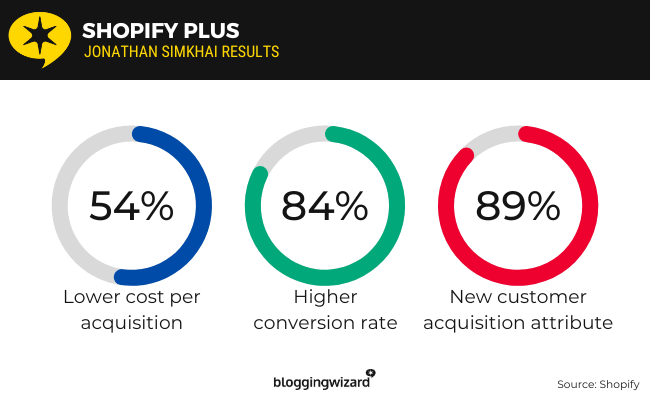
They also saw a cost per acquisition that was 54% lower.
Source: Shopify1, Shopify4
12. 35% of Shopify Plus merchants are seeing smaller average cart sizes
According to a global survey Shopify conducted on Shopify Plus merchants, 35% of Shopify Plus merchants saw smaller average cart sizes in 2022, meaning when customers placed orders, they weren’t buying as much as they used to.
The survey was conducted in August and September of 2022.
For information’s sake, Shopify Plus is the name of the plan Shopify designates for high-volume ecommerce businesses.
An ecommerce business interested in this plan is looking at a starting rate of $2,000/month, much more than Shopify’s base plan, which costs $39/month, or the Starter plan for selling through a content management system like WordPress or social media apps, which costs $5/month.
Source: Shopify’s Commerce Trends Report for 2023
13. 50% of Shopify Plus merchants saw less site traffic and lower conversions in 2022
Shopify’s survey on Shopify Plus merchants also revealed how 50% of the platform’s high-volume customers saw less traffic on their site in 2022, which means many saw much lower conversions than usual.
In fact, in the second quarter of 2022, Shopify store owners reported seeing spikes in their inventory-to-sales ratios for products priced at over $100.
This is likely the result of consumer response to inflation.
Source: Shopify’s Commerce Trends Report for 2023
14. Higher costs of operation are having a negative impact on 90% of Shopify Plus merchants
While not all Shopify Plus merchants are struggling as far as cart sizes and site traffic go, a large majority, 90% to be exact, say they are being negatively impacted by higher costs.
Source: Shopify’s Commerce Trends Report for 2023
15. Over 50% of Shopify Plus merchants lost sales due to products being out of stock in 2022
Shopify’s survey on Shopify Plus merchants revealed that nearly six out of 10 merchants reported losing Shopify sales due to products being out of stock in 2022.
If you own an online store, this is a great sign to take a look at your current inventory management system to ensure you’re keeping your store’s most popular products in stock.
If you make handmade goods, you may need to hire additional staff to increase your output.
For Shopify Plus merchants, Shopify’s survey revealed that 30% of merchants have found new suppliers to combat supply chain issues.
29% source their products from multiple suppliers in multiple countries while 31% source products and raw materials locally.
Source: Shopify’s Commerce Trends Report for 2023
16. 16% of Amazon sellers also use Shopify
According to data collected by Statista, 16% of sellers who list their products in the Amazon Marketplace also put them up for sale in a Shopify store.
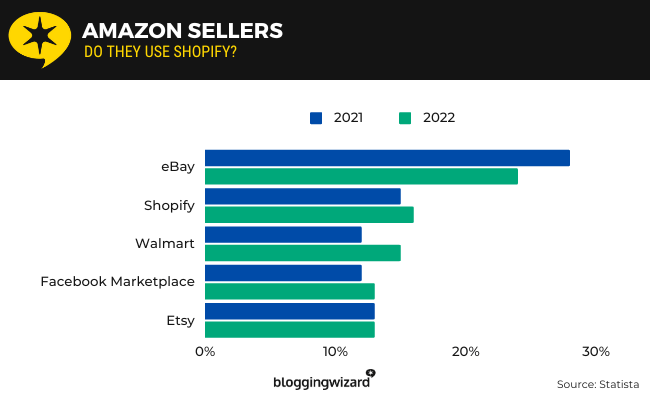
Unsurprisingly, 24% of these sellers use eBay.
15% use Walmart, 13% use Facebook Marketplace and another 13% use Etsy.
Source: Statista
17. Fashion Nova is the most popular Shopify store
When you look at lists of successful Shopify stores, Fashion Nova is always near the top.
In fact, this store brings in 25.4 million visits per month on average.
The store is one of the most popular women’s fashion shops on the web, though they do have a small men’s section as well.
Source: Myip.ms, Similarweb6
Shopify statistics for Shopify themes
18. There are only 136 themes in the Shopify theme store
Shopify’s app store is huge.
Shopify’s theme store, on the other hand, is quite small.
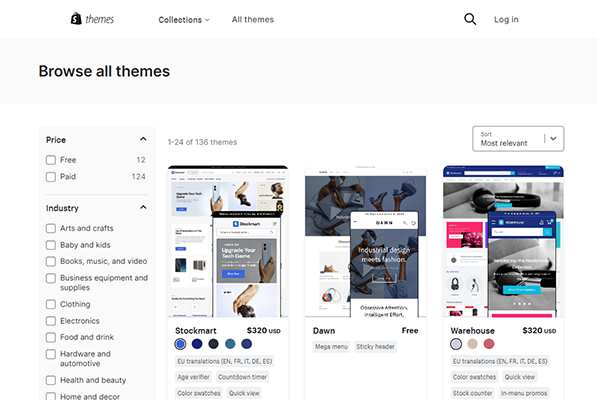
While there are thousands of free and premium themes that are made for or at least compatible with WordPress’ chosen ecommerce platform WooCommerce, Shopify’s official theme store only has 136.
This is one way in which Shopify does not dominate the ecommerce software market.
To be fair, the themes that are available are well coded and look just fine, but it’d be better if the web’s most popular ecommerce platform offered more variety to users who may not have the funds to have a custom theme developed while they’re just starting out.
Source: Shopify Theme Store
19. Dawn is the most popular Shopify theme
Dawn, a free theme developed by Shopify themselves, is the most popular theme available in the Shopify theme store.
While Shopify doesn’t have download or install statistics readily available, when you filter all themes by popularity, Dawn appears first.
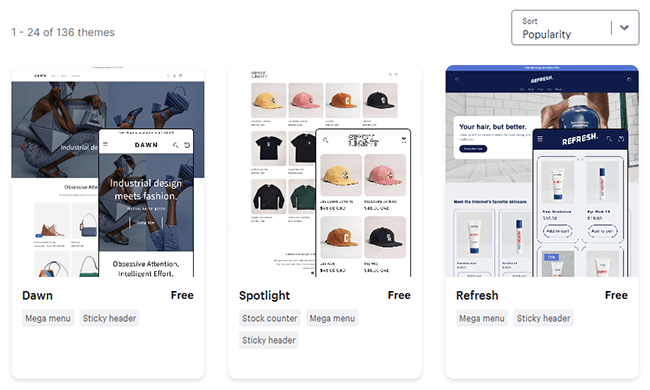
This is followed by a few additional free themes, specifically Spotlight and Refresh.
However, only 35% of Dawn’s and 14% of Refresh’s reviews are positive.
Spotlight didn’t have any reviews at the time this article was written.
Source: Shopify Theme Store – By Popularity (All Themes)
20. Impulse is the most popular paid theme for Shopify
Impulse, a sleek theme for fashion shops from Archetype Themes, is the most popular paid theme in the Shopify theme store.
At least, that’s the cause when you view only paid themes and filter the view by popularity.
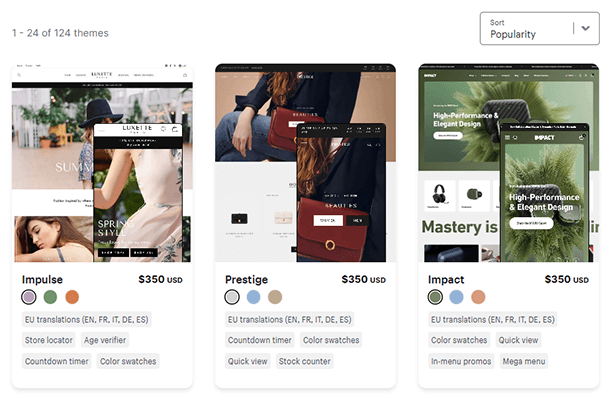
In second and third places are Prestige and Impact.
All three themes cost $350 each.
95% of Impulse’s, 91% of Prestige’s and 94% of Impact’s reviews are positive.
Source: Shopify Theme Store – By Popularity (Paid Themes)
21. 26.61% of Shopify stores in the United States use a custom theme
According to BuiltWith’s data on Shopify themes, 26.61% of Shopify stores based in the U.S. use custom-made themes.
These are themes made personally by developers as opposed to ready-made themes you can install in just a few clicks.
26.64% of stores use Dawn while 12.39% use the ever popular Debut theme.
1.2% use the Impulse theme.
Source: BuiltWith5
Shopify statistics for Shopify apps
22. There are more than 8,000 apps in the Shopify app store
According to Shopify’s own data on its app store, there are more than 8,000 first and third-party apps in the platform’s official app store.
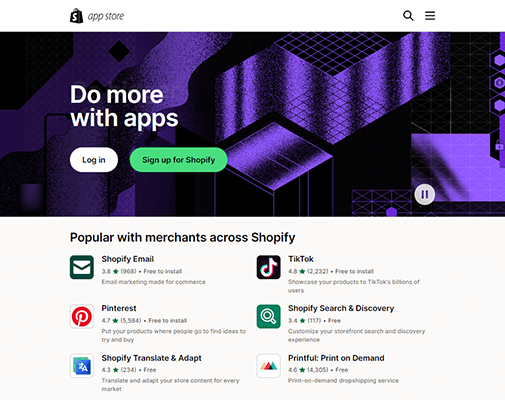
The platform explains how each app is vetted properly by a 100-checkpoint system.
Source: Shopify App Store
23. Privy is one of the most popular Shopify apps with over 24,000 reviews
Privy is one of the most popular apps in the Shopify app store.
It has a 4.6-star rating out of over 24,800 reviews, making it one of the most reviewed apps in the store.

This also makes it one of the most popular apps for lead generation as it features a drag-and-drop email opt-in form builder and includes support for popups.
With no download or install statistics, the only way we can determine the popularity of an app is by using its review count.
Source: Shopify App Store – Privy
24. Judge.me is the most popular app for product reviews with over 15,000 reviews
Judge.me is one of the most popular apps in the Shopify app store.
It has a 5-star rating out of over 15,200 reviews.
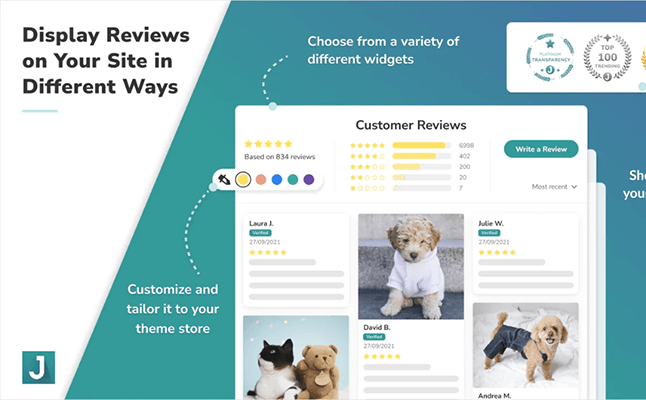
It’s primarily used to collect and display product reviews on shop pages, but it has a handful of additional features that make it quite powerful.
They include the ability to share reviews on Facebook, Instagram, Twitter, rich snippets and Google Shopping, among other things.
Source: Shopify App Store – Judge.me
25. Booster SEO is the most popular app for SEO with more than 4,000 reviews
Booster SEO is one of the most popular apps for SEO in the Shopify app store.
It has a 4.9-star rating out of over 4,700 reviews.
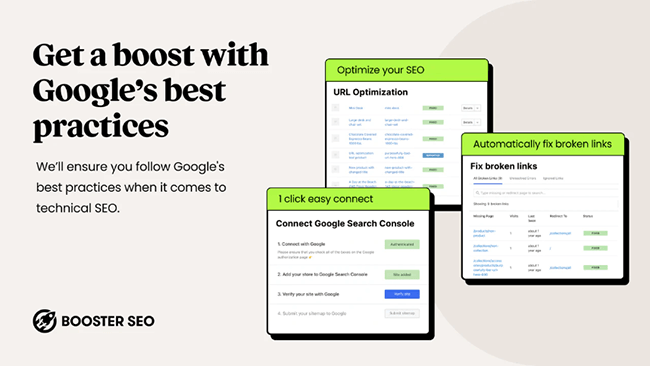
This app has key SEO tools that optimize your images to improve page speed, find and fix SEO issues based on rules you customize, and fix broken links with redirects.
Source: Shopify App Store – Booster SEO
26. Hextom is the most popular app for increasing conversions with over 7,000 reviews
Hextom is one of the popular apps for boosting online sales for a Shopify store.
It has a 4.8-star rating out of over 7,600 user reviews.
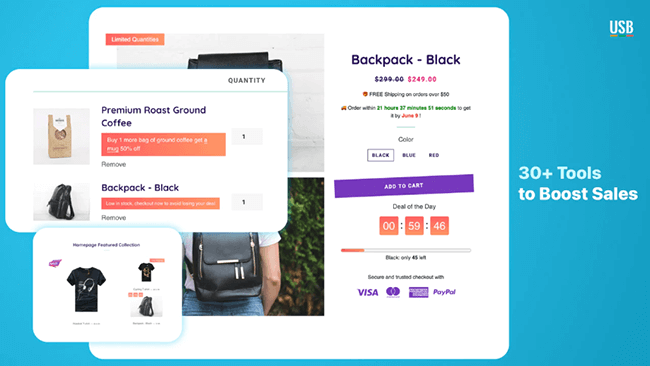
This app combines over 30 tools in a single app, but it’s mostly known for its countdown timer and trust badge functionalities.
Source: Shopify App Store – Hextom
27. PageFly is the most popular landing page builder for Shopify with over 7,000 reviews
There are a few different landing page apps available for Shopify, but PageFly is the most popular by far.
It has a 4.9-star rating out of over 7,600 reviews in the app store.

The app has prebuilt landing page templates you can add to your store, but it also has a drag-and-drop builder you can use to create your own designs.
Source: Shopify App Store – PageFly
28. DSers is the most popular app for dropshipping with over 15,000 reviews
DSers, which allows you to connect your Shopify store to the AliExpress dropshipping system, is the most popular dropshipping app available for Shopify.
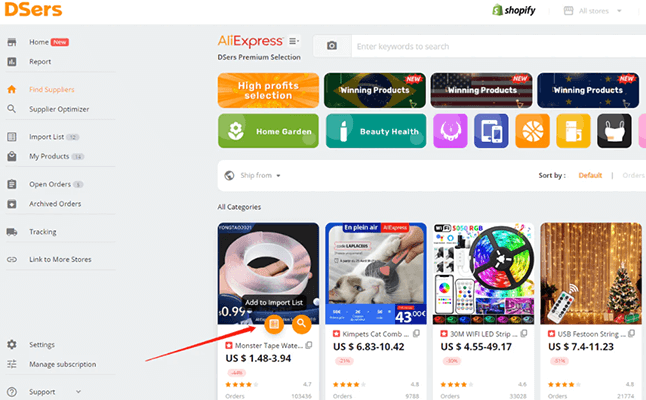
While already popular at the time, it rose in popularity when fellow dropshipping app Oberlo got shut down.
DSers has a 5-star rating out of over 15,500 reviews.
Source: Shopify App Store – DSers
29. Order Printer Templates is the most popular app for order fulfillment with more than 1,000 reviews
Order Printer Templates has the most reviews out of every order fulfillment app available for Shopify.
It has a 4.9-star rating out of over 1,100 reviews.

It lets you customize invoice, packing slip, return form and gift receipt templates.
It’s even compatible with Shopify’s Order Printer apps.
Source: Shopify App Store – Order Printer Templates
30. Recart is the most popular Shopify app for abandoned cart recovery with over 5,000 reviews
Recart is the most popular app in the Shopify app store for abandoned cart recovery purposes.
It has a 4.8-star rating out of over 5,500 reviews.

It’s an SMS marketing app with a special focus on recovering abandoned carts by capturing text and email-based leads through custom popups.
You can even use it to automate the abandoned cart recovery process.
Source: Shopify App Store – Recart
Shopify statistics sources
Final thoughts
That concludes our list of Shopify statistics.
We learned how dominant the Shopify platform is in the greater ecommerce platform market, especially how it’s starting to overtake WooCommerce.
We also learned that although Shopify’s revenue greatly increased in 2022, Shopify merchants, especially Shopify’s most successful merchants, are starting to see the effects of inflation in the form of lower conversions and site traffic.
Lastly, we learned quite a bit about Shopify’s top themes and apps as well as how a great portion of Shopify stores use custom themes.
For additional reading:

















